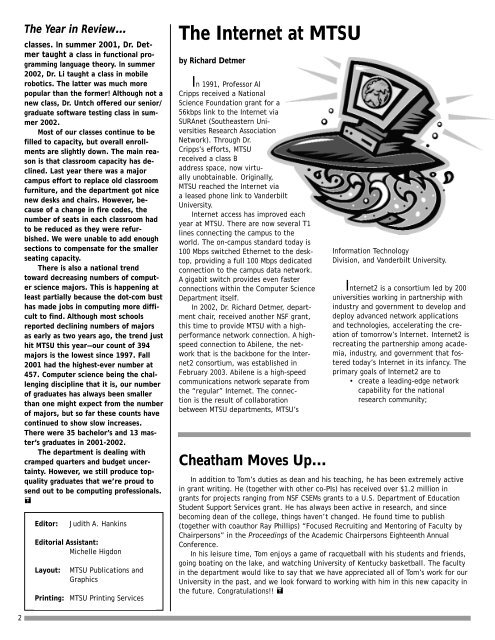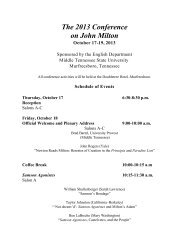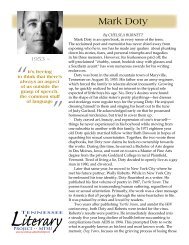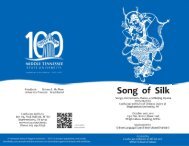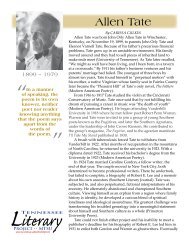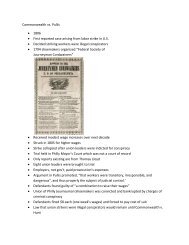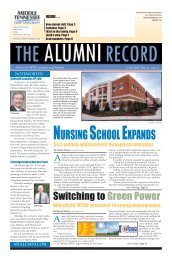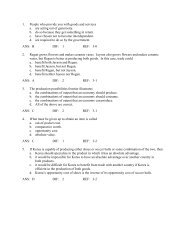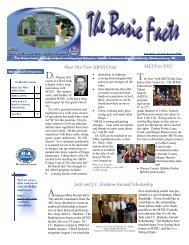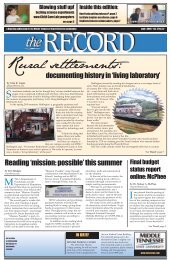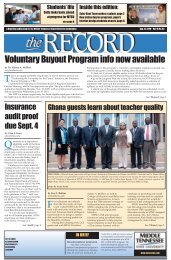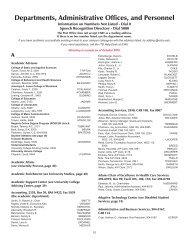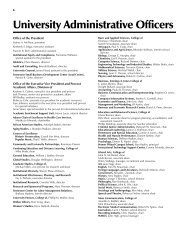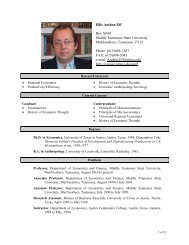Cheatham Moves Up As Dean - Middle Tennessee State University
Cheatham Moves Up As Dean - Middle Tennessee State University
Cheatham Moves Up As Dean - Middle Tennessee State University
You also want an ePaper? Increase the reach of your titles
YUMPU automatically turns print PDFs into web optimized ePapers that Google loves.
2<br />
The Year in Review…<br />
classes. In summer 2001, Dr. Detmer<br />
taught a class in functional programming<br />
language theory. In summer<br />
2002, Dr. Li taught a class in mobile<br />
robotics. The latter was much more<br />
popular than the former! Although not a<br />
new class, Dr. Untch offered our senior/<br />
graduate software testing class in summer<br />
2002.<br />
Most of our classes continue to be<br />
filled to capacity, but overall enrollments<br />
are slightly down. The main reason<br />
is that classroom capacity has declined.<br />
Last year there was a major<br />
campus effort to replace old classroom<br />
furniture, and the department got nice<br />
new desks and chairs. However, because<br />
of a change in fire codes, the<br />
number of seats in each classroom had<br />
to be reduced as they were refurbished.<br />
We were unable to add enough<br />
sections to compensate for the smaller<br />
seating capacity.<br />
There is also a national trend<br />
toward decreasing numbers of computer<br />
science majors. This is happening at<br />
least partially because the dot-com bust<br />
has made jobs in computing more difficult<br />
to find. Although most schools<br />
reported declining numbers of majors<br />
as early as two years ago, the trend just<br />
hit MTSU this year—our count of 394<br />
majors is the lowest since 1997. Fall<br />
2001 had the highest-ever number at<br />
457. Computer science being the challenging<br />
discipline that it is, our number<br />
of graduates has always been smaller<br />
than one might expect from the number<br />
of majors, but so far these counts have<br />
continued to show slow increases.<br />
There were 35 bachelor’s and 13 master’s<br />
graduates in 2001-2002.<br />
The department is dealing with<br />
cramped quarters and budget uncertainty.<br />
However, we still produce topquality<br />
graduates that we’re proud to<br />
send out to be computing professionals.<br />
�<br />
Editor: Judith A. Hankins<br />
Editorial <strong>As</strong>sistant:<br />
Michelle Higdon<br />
Layout: MTSU Publications and<br />
Graphics<br />
Printing: MTSU Printing Services<br />
The Internet at MTSU<br />
by Richard Detmer<br />
In 1991, Professor Al<br />
Cripps received a National<br />
Science Foundation grant for a<br />
56kbps link to the Internet via<br />
SURAnet (Southeastern Universities<br />
Research <strong>As</strong>sociation<br />
Network). Through Dr.<br />
Cripps’s efforts, MTSU<br />
received a class B<br />
address space, now virtually<br />
unobtainable. Originally,<br />
MTSU reached the Internet via<br />
a leased phone link to Vanderbilt<br />
<strong>University</strong>.<br />
Internet access has improved each<br />
year at MTSU. There are now several T1<br />
lines connecting the campus to the<br />
world. The on-campus standard today is<br />
100 Mbps switched Ethernet to the desktop,<br />
providing a full 100 Mbps dedicated<br />
connection to the campus data network.<br />
A gigabit switch provides even faster<br />
connections within the Computer Science<br />
Department itself.<br />
In 2002, Dr. Richard Detmer, department<br />
chair, received another NSF grant,<br />
this time to provide MTSU with a highperformance<br />
network connection. A highspeed<br />
connection to Abilene, the network<br />
that is the backbone for the Internet2<br />
consortium, was established in<br />
February 2003. Abilene is a high-speed<br />
communications network separate from<br />
the “regular” Internet. The connection<br />
is the result of collaboration<br />
between MTSU departments, MTSU’s<br />
<strong>Cheatham</strong> <strong>Moves</strong> <strong>Up</strong>…<br />
Information Technology<br />
Division, and Vanderbilt <strong>University</strong>.<br />
Internet2 is a consortium led by 200<br />
universities working in partnership with<br />
industry and government to develop and<br />
deploy advanced network applications<br />
and technologies, accelerating the creation<br />
of tomorrow’s Internet. Internet2 is<br />
recreating the partnership among academia,<br />
industry, and government that fostered<br />
today’s Internet in its infancy. The<br />
primary goals of Internet2 are to<br />
• create a leading-edge network<br />
capability for the national<br />
research community;<br />
In addition to Tom’s duties as dean and his teaching, he has been extremely active<br />
in grant writing. He (together with other co-PIs) has received over $1.2 million in<br />
grants for projects ranging from NSF CSEMs grants to a U.S. Department of Education<br />
Student Support Services grant. He has always been active in research, and since<br />
becoming dean of the college, things haven’t changed. He found time to publish<br />
(together with coauthor Ray Phillips) “Focused Recruiting and Mentoring of Faculty by<br />
Chairpersons” in the Proceedings of the Academic Chairpersons Eighteenth Annual<br />
Conference.<br />
In his leisure time, Tom enjoys a game of racquetball with his students and friends,<br />
going boating on the lake, and watching <strong>University</strong> of Kentucky basketball. The faculty<br />
in the department would like to say that we have appreciated all of Tom’s work for our<br />
<strong>University</strong> in the past, and we look forward to working with him in this new capacity in<br />
the future. Congratulations!! �


